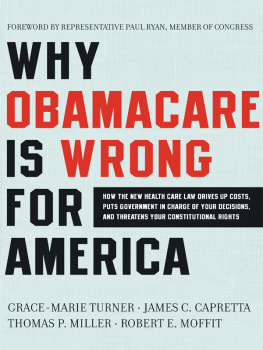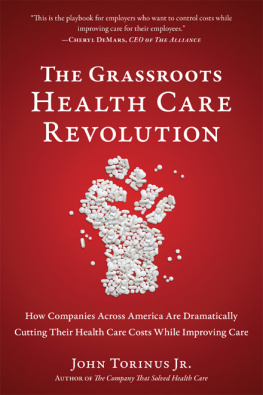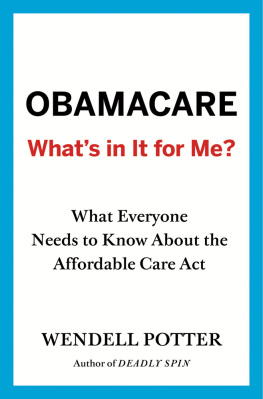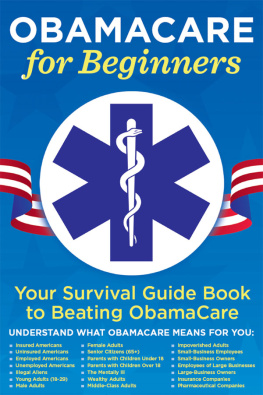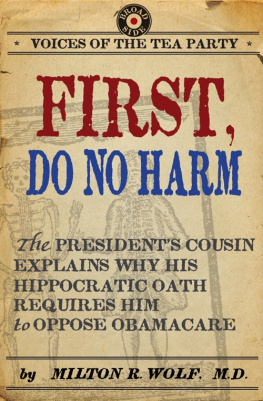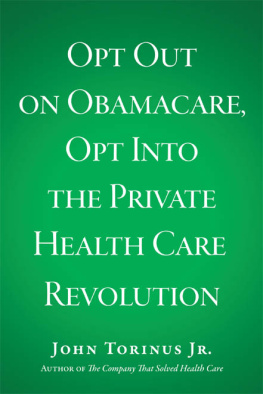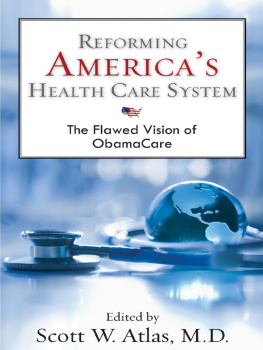T his important book provides an engaged citizenry with a clear diagnosis of why ObamaCare is the wrong prescription for American health care and points the way to genuine, patient-centered reform.
Despite all of the talk of ObamaCares benefits, this book explains that the new lawmisleadingly titled the Patient Protection and Affordable Care Actwill actually compound the worst problems in todays arrangements, most especially by driving out-of-control costs even higher.
Fortunately, while ObamaCare has been enacted into law, it is far from settled policy. A clear majority of the electorate favors its repeal.
And for good reason: as this book explains, this new law starts from the premise that the nations health care system can, and should, be run from Washington, D.C. Under ObamaCare, power is shifted from patients, doctors, businesses, and states to the federal government. That will erode the doctor-patient relationship, lead to waiting lists for treatment, and foster widespread dependency on government-run health care. It will also impose a web of new regulations on businesses, stifling jobs and paychecks. On top of all this, it will add trillions in federal spending and push the nation more rapidly toward a debt crisis.
The result is that ObamaCare will make the health care cost problem worse, not better.
The exploding cost of health care is bankrupting the country, yet the governments open-ended commitment to subsidizing health care is the very reason costs are skyrocketing. Simply put, everyone who participates in the health care system is a rational economic actor, and ObamaCare will aggravate distortions in the current system and create perverse incentives for Americans to maximize their share of an ever-growing, increasingly opaque, and apparently limitless subsidy.
The authors of this book effectively contrast the two divergent paths for health care in America: the government-centric approach versus the patient-directed model. Decades of Medicare price controls have failed to control spending. Instead of cutting costs, price controls encourage providers to bill for more services each year. Medicaid is blowing out state budgetsthere is no limit on the federal governments matching contributions to state spending, so state governments spend most of their energy devising ways to maximize how much they get from the federal government, while seeking to minimize their own share of the tab.1
The federal government also exempts employer-sponsored health insurance from taxation for workers. This policy tilts the compensation scale toward ever-greater (tax-free) benefits and away from higher (taxable) wages. This isnt just a big driver of runaway health care costs, as more dollars chase the same amount of services. Its also a big reason why too many Americans havent seen a raise in a long timethe rising cost of health care is eating away at their wages.
The new health care lawwith its maze of mandates, dictates, controls, tax hikes, and subsidieswill push costs further in the wrong direction. Already, health insurance companies have announced big premium hikes related to the laws new mandates. The laws so-called cost controls amount to the same kind of reimbursement cram-downs that have failed to control costs in Medicare. It will dramatically expand a Medicaid program that is already breaking state budgets and adding to a growing flood of red ink at the federal level. And it will create a new open-ended entitlement program at a time when we cant afford the entitlements we have.
We cannot find a bipartisan way forward on health care until Congress removes this partisan roadblock. While it is a prerequisite to real reform, repeal of ObamaCare alone will not be enough. We must also fix whats broken in health care, without breaking whats working.
In addition to clearly describing the problem, this book puts forward a framework for reform that will secure affordable, high-quality health care for Americans. It clearly illustrates how we must transform our governments reliance on defined benefits, which provide a false sense of security, to one of defined contributions, which provide the real security that comes with ownership, control, and flexibility.
This path to true choice and competition is reflected in health care reform proposals Ive put forward in Congress. Im proud to have worked with former Clinton administration budget director Alice M. Rivlin to advance some of these reforms, which is an indication that it is possible to build bipartisan support for policies that allow consumers and patients to make choices for themselves, even as the government provides sensible oversight of the marketplace.
In health care, as in any other economic arrangement, control of money is power. The question remaining is then: who gets the power, the government or the patient? Patient power will always serve the needs of the people far better than bureaucrats managing the decline of a government-run system on the verge of bankruptcy.
Giving patients and consumers control over health care resources would make all Americans less dependent on big corporations and big government for our health security, give us more control over the care we get, and force health care providers to compete for our business.
Over the next few years, the debate over ObamaCare will be critical to the health care all Americans receive and to the sustainability of the U.S. economy. The American people will play an indispensable role in this debate. Together, we can repeal this costly mistake before it hits with full force, and we can chart a new direction with true patient-centered health care reform.
Rep. Paul Ryan , Member of Congress

